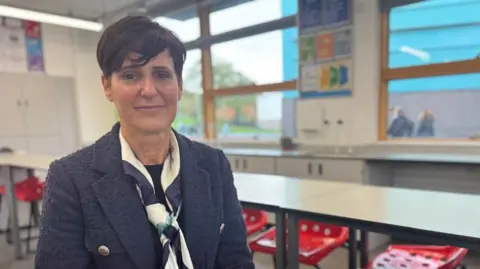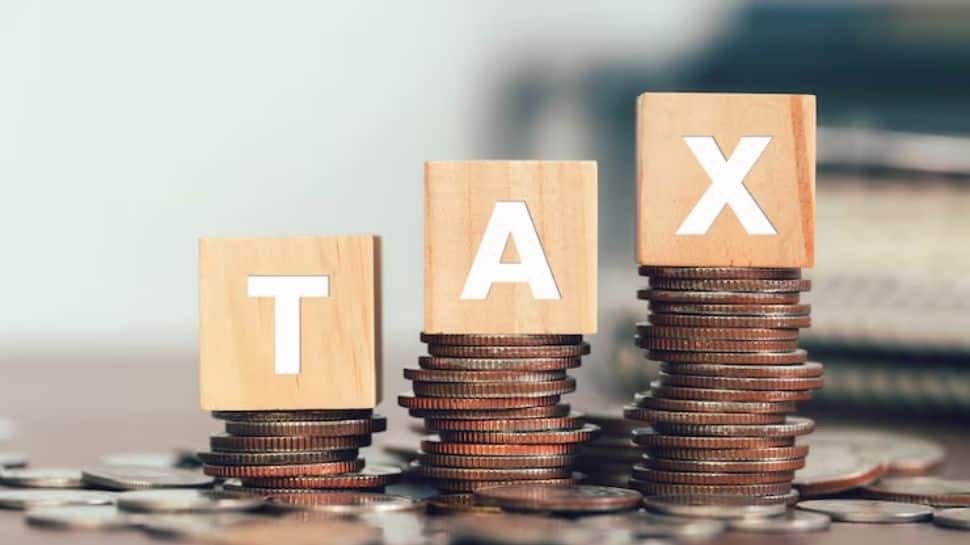Business
Mortgages and AI to be added to the curriculum in English schools

 Getty Images
Getty ImagesChildren will be taught how to budget and how mortgages work as the government seeks to modernise the national curriculum in England’s schools.
They will also be taught how to spot fake news and disinformation, including AI-generated content, following the first review of what is taught in schools in over a decade.
Education Secretary Bridget Phillipson said the government wanted to “revitalise” the curriculum but keep a “firm foundation” in basics like English, maths and reading.
Head teachers said the review’s recommendations were “sensible” but would require “sufficient funding and teachers”.
The government commissioned a review of the national curriculum and assessments in England last year, in the hope of developing a “cutting edge” curriculum that would narrow attainment gaps between the most disadvantaged students and their classmates.
It said it would take up most of the review’s recommendations, including scrapping the English Baccalaureate (EBacc), a progress measure for schools introduced in 2010.
It assesses schools based on how many pupils take English, maths, sciences, geography or history and a language – and how well they do.
The Department for Education (DfE) said the EBacc was “constraining”, and that removing it alongside reforms to another school ranking system, Progress 8, would “encourage students to study a greater breadth of GCSE subjects”, like arts.
The former Conservative schools minister, Nick Gibb, said the decision to scrap the EBacc would “lead to a precipitous decline in the study of foreign languages”, which he said would become increasingly centred on private schools and “children of middle class parents who can afford tutors”.
Other reforms coming as a result of the curriculum review include:
- Financial literacy being taught in maths classes, or compulsory citizenship lessons in primary schools
- More focus on spotting misinformation and disinformation – including exploring a new post-16 qualification in data science and AI
- Cutting time spent on GCSE exams by up to three hours for each student on average
- Ensuring all children can take three science GCSEs
- More content on climate change
- Better representation of diversity
The review also recommended giving oracy the same status in the curriculum as reading and writing, which the charity Voice 21 said was a “vital step forward” for teaching children valuable speaking, listening, and communication skills.
However, the government is not taking up all of the review’s recommendations.
It is pushing ahead with the reading tests for Year 8 pupils reported in September, whereas the review recommended compulsory English and maths tests for that year group.
Asked why she stopped short of taking up the review’s recommendation, Phillipson told the BBC that pupils who are unable to read “fluently and confidently” often struggle in other subjects.
And she addressed the claims that scrapping the EBacc could lead to fewer pupils taking history, geography and languages at GCSE, saying the measure “hasn’t led to improved outcomes” or “improvement in language study”.
“I want young people to have a good range of options, including subjects like art and music and sport. And I know that’s what parents want as well,” she said.
She said ministers recognised “the need to implement this carefully, thoroughly and with good notice”, adding that schools would have four terms of notice before being expected to teach the new curriculum.
Prof Becky Francis, who chaired the review, said her panel of experts and the government had both identified a “problem” pupils experience during the first years of secondary school.
“When young people progress from primary into secondary school, typically this is a time when their learning can start falling behind, and that’s particularly the case for kids from socially disadvantaged backgrounds,” she told the BBC.

She said the approach to the review was “evolution not revolution”, with England’s pupils already performing relatively well against international averages.
She said the call for more representation of diversity in the curriculum was not about “getting rid of core foundational texts and things that are really central to our culture”, but was more about “recognising where, both as a nation but also globally, there’s been diverse contribution to science and cultural progress”.
Shadow Education Secretary Laura Trott said the changes “leave children with a weaker understanding of our national story and hide standards slipping in schools”.
“Education vandalism will be the lasting legacy of the prime minister and Bridget Phillipson,” she added.
Pepe Di’Iasio, general secretary of the Association of School and College Leaders, said the review had proposed “a sensible, evidence-based set of reforms”.
But he said delivering a “great curriculum” also required “sufficient funding and teachers”, adding that schools and colleges did not currently have all the resources they need.
He said a set of “enrichment benchmarks” – which the government said would offer pupils access to civic engagement, arts and culture, nature and adventure, sport, and life skills – had been announced “randomly” and “added to the many expectations over which schools are judged”.
Additional reporting by Hope Rhodes
Business
Car finance: What happened and how much compensation will be paid?

Millions could be entitled to compensation as a result of commission arrangements between lenders and dealers.
Source link
Business
Over 2.5 crore Aadhaar Numbers deactivated by govt due to…

New Delhi: The Unique Identification Authority of India (UIDAI) has deactivated more than 2.5 crore Aadhaar numbers of deceased persons till date. This is as part of a nationwide clean-up effort to maintain the continued accuracy and integrity of the Aadhaar database, Union Minister of State for Electronics and Information Technology Shri Jitin Prasada in Lok Sabha on Wednesday.
Aadhaar is the world’s largest biometric identity system with approximately 134 crores live Aadhaar holders.
In case of the death of a person, it is essential that his/her Aadhaar number is deactivated to prevent potential identity fraud, or unauthorized usage of such Aadhaar number for availing welfare benefits.
The State / UT mentioned in the address of an Aadhaar number holder in the Aadhaar database may vary from the State / UT where death was registered.
Measures to prevent potential identity fraud
Government has said that several measures have been taken to reduce the risk of identity fraud and ensure leak-proof delivery of benefits in the country.
The key measures include:
Biometric Lock/Unlock feature enables an Aadhaar number holder to “Lock” his biometrics, preventing any unauthorized authentication attempts.
Aadhaar Lock/Unlock feature for an Aadhaar number holder.
Deployment of Face Authentication having ‘Liveness Detection feature’ to prevent spoofing and ensure the physical presence of the beneficiary during transactions.
Offline Verification: Promotion of Aadhaar Secure QR Code, Aadhaar paperless offline e-KYC, e-Aadhaar and Aadhaar verifiable credentials for offline identity verification.
No sharing of Core Biometric information of Aadhaar number holders in any manner by UIDAI.
Secure Data Storage: Mandatory use of Aadhaar Data Vaults by all requesting entities to store Aadhaar numbers in an encrypted format.
Database Sanitization: Regular de-duplication and deactivation of Aadhaar numbers belonging to deceased persons.
Updation of demographic details of an Aadhaar number holder is allowed only as per documents listed by UIDAI.
UIDAI has launched a new Aadhaar app which facilitates sharing of verified credentials by Aadhaar number holder with the Offline Verification Seeking Entities (OVSE) in a secure and seamless manner.
Business
TDS alert! Important February compliance dates you must track– Check Full list

New Delhi: February 2026 brings a series of important deadlines related to Tax Deducted at Source (TDS) that taxpayers and deductors should not overlook. From issuing TDS certificates to submitting mandatory statutory forms, these compliance dates play a key role in ensuring smooth and accurate tax reporting. Businesses, employers, and government offices must stay alert and complete the required filings on time to avoid penalties or complications under the Income-tax Act. Keeping track of these dates can help ensure hassle-free compliance and prevent last-minute stress.
February 14:
– Deadline for issuing TDS certificate under Section 194-IA for tax deducted on transfer of immovable property in December 2025.
– Deadline for issuing TDS certificate under Section 194-IB for tax deducted on rent paid by individuals or HUFs in December 2025.
– Deadline for issuing TDS certificate under Section 194M for tax deducted on contractual or professional payments made in December 2025.
– Deadline for issuing TDS certificate under Section 194S for tax deducted on transfer of virtual digital assets by specified persons in December 2025.
February 15:
– Deadline for government offices to furnish Form 24G where TDS/TCS for January 2026 was deposited without generating a challan.
– Deadline for issuing the quarterly TDS certificate for non-salary payments for the quarter ended December 31, 2025.
-

 Sports1 week ago
Sports1 week agoPSL 11: Local players’ category renewals unveiled ahead of auction
-

 Sports1 week ago
Sports1 week agoCollege football’s top 100 games of the 2025 season
-

 Entertainment1 week ago
Entertainment1 week agoClaire Danes reveals how she reacted to pregnancy at 44
-

 Business1 week ago
Business1 week agoBanking services disrupted as bank employees go on nationwide strike demanding five-day work week
-

 Politics1 week ago
Politics1 week agoTrump vows to ‘de-escalate’ after Minneapolis shootings
-

 Sports1 week ago
Sports1 week agoTammy Abraham joins Aston Villa 1 day after Besiktas transfer
-

 Entertainment1 week ago
Entertainment1 week agoK-Pop star Rosé to appear in special podcast before Grammy’s
-

 Tech1 week ago
Tech1 week agoBrighten Your Darkest Time (of Year) With This Smart Home Upgrade






